Chapter 8 Great Minds (Vocabulary3)课件(牛津深圳版九年级全册)
Chapter 8 Great Minds (Vocabulary2)课件(牛津深圳版九年级全册)
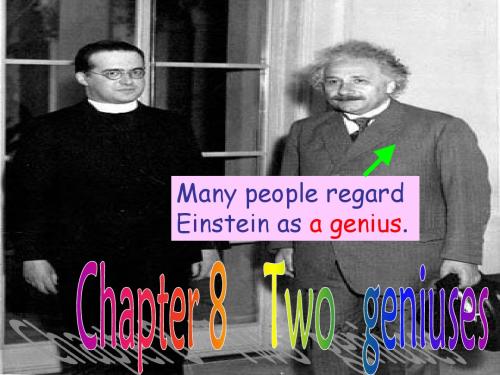
curiosity n. ★ 例句:Curiosity _______ is part of human nature. curious adj. be curious about… 对…感到好奇 be curious to do sth. 例句:Children are ________ curious about everything round them.
gifted (adj.) 有天赋的; 天资聪慧的(talented) e.g. She has a gift for dancing/music.
John has many outstanding gifts.
Lang Lang is a gifted musician.来自Zxx```k★
attempt 1.His ____________ to work as a actress makes everyone excited.
★ distant adj. 遥远的,远处的
distantly adv. distance What is the ___________between Guangzhou and Shenzhen? How far is it from Guangzhou to =______________________________ ?
perfect answer • perfect adj. 完美的 This is a ______
perfectly adv. 完美地 (without any mistake; in a very good way)
perfectly She speaks English __________.
We all know her called (named) Debbie. I will call you up this evening. =I’ll ring you up this evening. I have a few calls to make. (我要打几个电话) There is morning call in the hotel.
Chapter 8 Great Minds (reading 2)课件(牛津深圳版九年级全册)

2. Which of these are or were fictional characters? Which of these are of were real people?
real person
fictitious character
real person
real person
B. Look and think B1. Look at the title, the pictures and
sense of humour
Words review
theory n. 理论 n. 讲台 n. 鼓掌;喝彩 把…看作
platform
applause regard…as let…down
使…失望
learn…by heart 熟记
Lead-in:
What is a genius?
Can you name some geniuses?
牛津深圳版初中英语 九年级全一册
Chapter 8
Great minds
Reading
汉语是我们的母语,我们从学英语开 始,就是用汉语来解释和记忆英语的。 变“用汉语解释和记忆英语”为“用 英语解释和记忆英语”。避免了将英 语转换为另一种语言——汉语所带来 的不便和时间耗费。不但提高了效率, 而且久而久之,有可能在头脑中建立 起两种思维系统,即在在汉语思维之 外,还可以逐步建立起独立的英语思 维系统。
Einstein was born in 1879 in Ulm, a city
in Germany.
As a boy, he was slow to learn to talk, but later in his childhood he showed great curiosity about nature and ability to solve difficult mathematical problems. After he left school, he went to Switzerland, where he graduated from the university with a degree in mathematics.
牛津深圳版英语九上Unit 2《Great minds》(Period 3)ppt课件
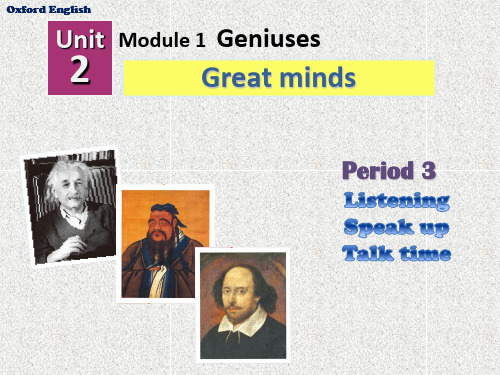
Unit Module 1 Geniuses
2
Great minds
Period 3
Role-play
In groups of three, act the story out.
Pre-listening
Three great minds
Look at the pictures and discuss the questions.
Albert Einstein
William Shakespeare
Cos.
Listening
Listen to a radio programme about three great minds and complete the information cards below. Write one word or figure in each blank.
She repeated his phone number and name.
“I’ll ask Dr Huang to return your call.”
Discuss with your partner and improve the conversation below.
Suggested conversation:
Talk time
Leaving and taking phone messages Sometimes people cannot answer calls. When this happens, we can leave and take messages like this:
Read the conversation below and practise it in pairs. Pay attention to the words in blue.
Chapter 8 Great Minds (writing 2)课件(牛津深圳版九年级全册)

About the tense:
Most stories are about the past, so verbs in stories are usually in the
past tense.
astronomer n.
天文学家 astronomy n. 天文学 give a talk Mr Moore 演讲
Part 1
1
One day, his producer told him that his next talk was on April
Fool’s Day. He advised
Moore to _____ play a joke
on his listeners. Moore
agreed _______. But Moore
Change the form of the verbs as necessary.
Verbs
agree notice arrive float jump forget obey play Other words wonderful
Floating listeners
Mr Moore is a famous astronomer. He playing harmless jokes on enjoys _______ people. Some years ago, he gave many wonderful talks about astronomy on the _________ radio.
Jupiter n.
木星
Neptune n.
海王星
producer n. 制作人
What happened on April Fool’s Day?
[Chapter 8 Great Minds (Listening & speaking)课件(牛津深圳版九年级全册)

twenty to five
three thirty half past three
three fifteen a quarter past three
three forty-five
a quarter to four
three o’clock
What time is it?
• It’s ... • get up
make a call // phone sb. // ring sb.
拨//打电话
answer // pick up the call // phone
接电话
put sb. through to sb.
给某某接通某某电话
Answers to the Exercise A3 Page 110
Receptionist =R Debbie =D
=very soon
Tom will return shortly. =Tom will be back very soon.
故意
I am sorry I didn’t break the window on purpose but by accident.
回答、回复
make no reply an early reply
alarm clock
one twenty twenty past one
three ten ten past three
zx````xk
eight five five past eight
Six fifty-five five to seven
five fifty ten to six
four forty
R: Good afternoon! City Observatory. D: Good afternoon! My name is Debbie. Brown, I am a student, and I’m looking for information on weather Forecasts. Can you help me?
Chapter 8 Great Minds (reading 3)课件(牛津深圳版九年级全册)

Read paragraphs 4-6, answer the questions.
1. Did Einstein want to give his lecture that night? Why? No,he didn’t. Because he was very tired 2.What did Hans offer to do?
so + that从句
It’s such sweet tea that I can’t drink it. The tea is so sweet that I can’t drink it.
2. In fact, it’s so easy that even my driver knows how to answer it.
1.regard sb. as… 把某人当作… Don’t _________ me _____ your servant! be regarded as… 被看作… Zhang Yimou _____________one of the most famous film directors. 2. gift have a gift for… 有…的天赋 =have a talent for…
gift n.--- gifted adj. He has a gift for music.
3. It’s a pleasure for sb. to do sth….
It’s a pleasure for me to help you with English
Chapter 8 Great Minds (非谓语动词之动词不定式)课件(牛津深圳版九年级全册)
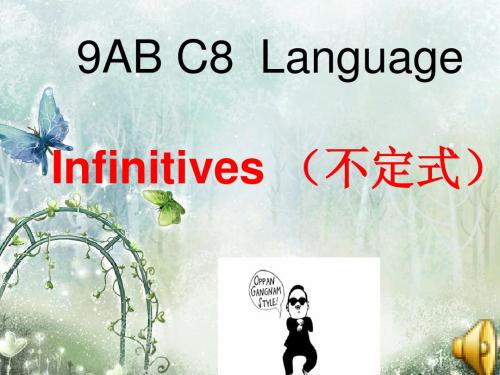
朗读体会、归纳 不定式的用法
朗读体会、归纳不定式的用法
小结一动词wish,decide,want,like,afford,offer,pretend, hope, agree,promise, refuse,manage to do sth. 小结二动词 show,know,decide,discuss; tell,teach, learn +疑问词(who, when, what, which, how等)+to do sth
小结三:动词encourage,invite, tell, persuade, help, like, want ,advise, order, permit, force+ sb to do sth(to do sth 做宾补) 小结四:名词 + to do (如果do为不及物动词,do 后 要加介词)
• When I was a little boy, my dream was to become a successful singer. So I worked hard in order to make it come true. But later I found it hard to sing well. It was heart-broken to hear people laugh at me. My teacher encouraged me to continue. She also showed me how to sing to music. I decided to work harder. Every morning when I woke up, the first thing to do was that I should open my mouth and practise singing. It took me 10 years to become famous. So everyone, come on!
广东九年级英语全册 Chapter 8 Great minds Grammar教学课件 牛津深圳版

⑤ 搁置问题抓住老师的思路。碰到自己还没有完全理解老师所讲内容的时候,最好是做个记号,姑且先把这个问题放在一边,继续听老师讲后面的 内容,以免顾此失彼。来自:学习方法网
② 根据自己预习时理解过的逻辑结构抓住老师的思路。老师讲课在多数情况下是根据教材本身的知识结构展开的,若把自己预习时所理解过的知识 逻辑结构与老师的讲解过程进行比较,便可以抓住老师的思路。
③ 根据老师的提示抓住老师的思路。老师在教学中经常有一些提示用语,如“请注意”、“我再重复一遍”、“这个问题的关键是····”等等,这些 用语往往体现了老师的思路。来自:学习方法网
A.how to do B. what to do with
C.how to do with D. what to do
编后语
老师上课都有一定的思路,抓住老师的思路就能取得良好的学习效果。在上一小节中已经提及听课中要跟随老师的思路,这里再进一步论述听课时如何 抓住老师的思路。
① 根据课堂提问抓住老师的思路。老师在讲课过程中往往会提出一些问题,有的要求回答,有的则是自问自答。一般来说,老师在课堂上提出的问 题都是学习中的关键,若能抓住老师提出的问题深入思考,就可以抓住老师的思路。
A 不定式结构作主语、宾语
To see one time is better than to hear a hundred times. 注:在很多情况下,特别是在口语中,如果 这个不定式主语宾语太长,常采用先行it代 替,而把不定式后置:
Chapter 8 Great Minds(3-Reading 2)学案(牛津深圳版九年级全册)

1. His attempt to explain how the universe works made him very famous.★attempt 在本句中作名词,意为“尝试,试图”句中的“to explain how the universe works”是动词不定式作定语,修饰前面的名词attempt。
可翻译为“他对解释宇宙如何运行的尝试”类似的动词不定式作定语的句子还有:I havc a lot of homework to do.我还有很多作业要去做。
本句中,不定式修饰名词.【小试身手】①我需要一些汉堡包来吃。
②没有理由来怀疑他的话。
attempt还可以作为动词,以为“尝试,试图”后面既可以接to do sth 也可接doing sth 如:He attempt to finish the task before July. 译为She attempted getting up, but she failed.译为2. It’s a pleasure to drive a genius like you. 能为你这样的天才开车,是一件令人愉快的事情。
★It’s a pleasure (for) sb to do sth 做某事是某人的荣幸= Sb is pleased to do sth如:It’s a pleasure for me to help you. = I am pleased to help you.【口语表达】My pleasure 对别人表示感谢的一种礼貌回答“不客气”With pleasure 客气的接受或者同意“当然了,很愿意”A: ---Can you take care of my cat?B: ---It's my pleasureA:---THANK YOU!B: ---With pleasure.【小试身手】--- Can you help me? ------ Thank you for helping me. ---No one knows you at this university, so they won’t find out. 这所大学没有人认识你,所以他们不会发现的。
Chapter 8 Great Minds (reading )课件(牛津深圳版九年级全册)

please 15. perfectly(形容词) perfect 16. funny(最高级) funniest
Fill the blanks with proper form, the first letter has given: enius 1.We all agree that he is a real g_____ because he always No.1 in all subjects. 2.Peter is r_______ egarded as one of the top students in our grade. 3.My father is busy with doing medical esearch on a weird disease. r_________ 4.The U.S.A is regarded as the most d______ eveloped country in the world. 5.Amanda has a g______ for drawing ift although she has never learned to draw.
invite curious
difficult/ hard disappoint sb 8. let someone down(同义)
9.development(动词)
develop 10.applause(动词) applaud 11. theory (复数) theories 12. fiction(形容词) fictional 13. genius(复数) geniuses
极好
e.g. According to the weather forecast it will be rainy tomorrow.
九年级英语 U8 Great minds
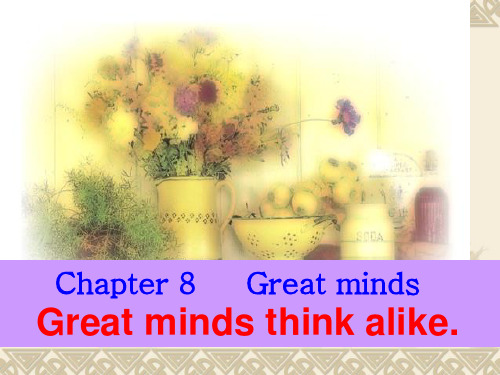
How does the story move on?
Read it carefully. Number the paragraphs and divide the passage into four parts.
Einstein
Hans
introduction
professor
__d_ri_v_e_r_
the lecture for him. ( ) 4.Hans had a good memory. ( ) 5.Hans gave a perfect lecture
and bnuot oanperoafseksesdoar t question ( ) 6.After giving a lecture, EHinasntesin drove the car again.
What Why How
A story shows that Einstein had a sense of humour Einstein felt so tired to give the lecture at the university Einstein and Hans changed their places successfully
Chapter 8 Great minds
Great minds think alike.
What do you know about Albert Einstein?
❖ He was born in Germany. ❖ He was a scientist. ❖ He discovered the theory of
offered to _g_iv_e_h_i_s_le_c_tu_r_e_fo_r__ _h_im__
Chapter 8 Great Minds (he keys to chapter8t)课件(牛津深圳版九年级全册)
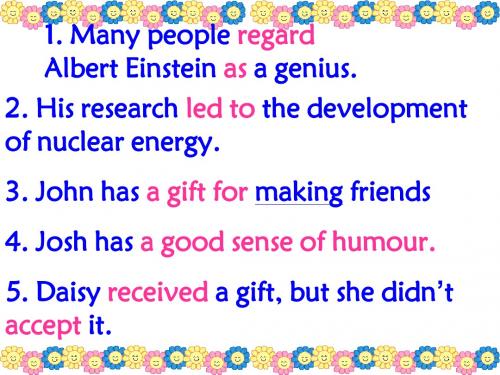
单选
ห้องสมุดไป่ตู้
1-5 C A D D B
Zx``````xk
6-10 A D B C C
1. Many people regard Albert Einstein as a genius. 2. His research led to the development of nuclear energy. 3. John has a gift for making friends 4. Josh has a good sense of humour.
16-20 A B C B A
11-15 D A D B A
9. I can’t let my audience down, can I?
10. The 3-year-old girl knows 300 Tang Poems by heart.
11. Please join us in the game.
Join in our game please. 12. This professor asked so difficult a question that Hans didn’t know what he was talking about. The question is so easy that even my driver knows how to answer it.
填空1.regard, led, nuclear energy2. gift, curiosity, sense, humour3. received, invitations, universities, pleasure, like4. agreed, gave, perfectly5. professor, idea, answered, left, driving, pleasure
广东九年级英语全册 Chapter 8 Great minds教学课件 牛津深圳版
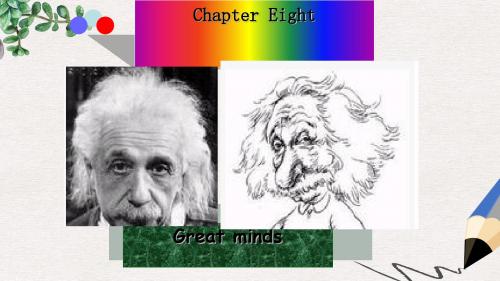
4.work
1)在上班;在
be at work 工作;在劳作
go to work 2)去上班
work out=solve 3)解决
work as 4)从事 =be+职业 work n (u)工作
works n工厂
Eg. Shew__o_r_k_sin an engimeerw__o_r_k.s
她在一个机器制造厂工作。
( F ) One evening, EHinisstdeirnivaeskreodfhfeisredrdivteor to give
the lecture for him.
( F ) Hans gave a perfect lecture
abnudt anporoofneessaosrkaedskaendyaqduieffsictiuoltnqs.uestion
scanning
True or False or DK
PayLmore attention to the first sentence of each paragraph:
True or false questions: ( T ) Albert Einstein was a genius. (huTm)oEri.nstein had a gift of curiosity and a sense of
Chapter Eight Great minds
new words
Beethoven
Mozart
★ 1. genius n. A person who is
very intelligent.天才
Here are two geniuses.
2. gift
=present礼物 =talent 天赋 a birthday/ Christmas/ wedding gift have a gift/talent for sth/for doing sth在某事上有天赋 e.g. She has a gift/talent for dancing.
最新最新出版自考英语(二)讲义-Unit-8--The-Great-Minds

最新最新出版自考英语(二)讲义-Unit-8--The-Great-Minds2013年自考“英语(二)”备考资料(新版教材unit 8)Unit 8 T he G r eat Mi n dsT he G r eat Mi nds名人名言部分补充m ak e A of BA f am ous quoteA pes s im is t m ak es diff ic ulties of h is opp or t unit ies; an o ptim is t m ak es oppor t un iti es of his d i ff ic ulties. ----H ar r y S. T r um an悲观者让机会沦为困难;乐观者把困难铸成机会。
----杜鲁门m ak e A of Bm ak e a s uc c es s of one's c ar eerm ak e a m us ic ian of th e l ittl e b o yT he f ather ex pos ed hi s s on to m us ic wh en he was s t il l a lit tle c h ildbec aus ed he w ant ed t o m ak e a m us ic ian of him.ex pos e s b. / on es elf t o s th.Don't ex p os e your s e lf to th e s tr ong s unl ig h t, or yo u wil l g et s u nb ur nt.联想:s un bur nt / s unt anne d gai n ex pos ur e to s t h.m ak e a f ootball er of T omm ak e a m es s of the a c c ountI. Ne w w or ds a nd ex p r es s ionsNe w wor ds1. wr ap v. 用…缠绕(或围紧)2. s c enar i o n. 设想;方案;预测3. ex p lan ati on n. 解释;说明ex pl ainex pl anat or y4. un ev entf ul adj. 平淡无奇的;平凡的;缺乏刺激的5. pr eg na nc y n. 怀孕;妊娠;孕期6. im per f ec t adj. 有缺陷的;不完全的;不完美的per f ec tper f ec tion联想:im pos s ible, i m polite, im bala nc ed,im m obile, im m atur e (注意:unb ias ed, unm ovi ng)7. ab nor m al adj. 不正常的;反常的;变态的;畸形的nor m al联想:t yp ic a l-at ypic als ym m etr y-as ym m etrys ym m etr ic al-as ym m etr ic al8. m as s ive adj. 巨大的;非常严重的9. d is abi li t y n.(某种)缺陷,障碍ab leab il it yuna bl e10. lim bles s adj. 无四肢的11. ins pir e v.激励;鼓舞(用法参考Uni t 5, T ex t A)ins p ir at ion (形近词参考U nit4,T ex t A)ins p ir in g12. a dap t v. 适应(新情况)ada pt o nes e lf to s th.13. ac c om plis h v. 完成14. lim b n. 肢;臂;腿15. c am paign运动(为社会、商业或政治目的而进行的一系列有计划的活动)16. f ulf il l v. 实现;履行f ulf ill one's dr e am / wor d / r e qu ir em entf ulf ill ing使人满足的,令人愉快的f ulf illm ent 履行;满足;成就17. m otiva tio na l a dj. 鼓舞的18. c ir c um s tanc e n. 命运;客观环境19. whol ehe ar ted l y a dv. 全心全意地20. ef f ec tive adj. 产生预期结果的;有效的比较:ef f ic ientin ef f ec tive, i nef f ic ient21. a lt itud e n.海拔;海拔高度alt itu de s ic k nes s区分:att itud e22. e nga gem ent n. 约定;约会;预约23. c on gr eg ati on n. (教堂的)会众24. a ud ienc e n. 观众;听众25. vis i on n. 想象力;眼力;远见卓识26. o utr eac h n. 外展服务27. p er s pec ti ve n. 态度;观点;思考方法28. c eas e v.(使)停止,终止,结束29. o bs tac le n. 障碍;阻碍;绊脚石30. il lus tr ate v. (用示例、图画等)说明,解释31. pr of ou nd adj. 巨大的;深切的;深远的32. p er s is tenc e n. 坚持;锲而不舍per s is t (i n)per s is te nt33. p ar al yze v. 使瘫痪;使麻痹34. of ten tim es adv. 常常35. tr ic k n. 戏法;把戏tr ic k y36. b le nd n. (不同事物的)和谐结合,融合37. p er s ev er anc e n. 毅力;韧性;不屈不挠的精神(偶见pers e ver enc e,但很少使用)per s ev er eper s ev er ant(偶见per s ever ent,但很少使用)38. d ef ine v. 阐明;明确;界定def in iti ondef in ite 明确的,确定的39. inc r ed ibl e a dj. 不能相信的;难以置信的unb el ie vab le40. c ap ti vat e v. 迷住;使着迷Phr as es a nd Ex pr es s i ons1. a w alk of lif e 行业;职业;地位;阶层li ne of wor k2. m aj or in 主修3. s tr es s the im por tanc e of强调…的重要性4. at one's d is pos a l 任某人处理;供某人任意使用5. pok e f un at 拿…开心;奚落;嘲笑6. s ho w of f炫耀;卖弄II. T ex t Lear n ingLif e W ithout Lim its① Im agine b ei ng bor n w ith out ar m s. N o ar m s to wr a p ar o und s o m eone, no h ands t o ex per ien c e touc h, or to hol d a noth er ha nd with. O r what abou t be in g bor n wi th out legs? Ha vin g n o a bil it y to da nc e, wa lk, r un, or eve n s tan d o n t wo f eet. N o w pu t bo th of th os e s c e nar i os(设想)toget her: n o ar m s and no le gs. W hat wou l d yo u d o? H o w wou ld thatef f ec t your ev er yd a y l if e?② Bor n i n 1982 in Me lbo ur ne, Aus tr a li a, wi thout an y m edic alex pla nat ion or war n in g, N ic h ol as Vuj ic ic c am e into the wor l d wi t hneit her ar m s nor legs. (1)H av in g ha d a n u n eve ntf ul pr egn anc y a nd n o f am il y h is tor y to ex p e c t this c on dit ion, im agin e th e s hoc k his pa r entsf elt whe n th e y s a w th eir f ir s t bor n, br and n e w ba b y bo y, onl y t o f ind he was what the wor l d woul d c ons i der im per f ec t and abn or m al. Ho w w ou ld their s o n l i ve a nor m al ha pp y l if e? W hat c ould he ev er do or bec om e when li v ing w ith wh at the wor ld wou ld s e e as s uc h a m as s ive di s abil it y (严重残疾)? (2)Lit tle did the y or an yo ne k no w t hat t his b eau tif u llim bles s bab y woul d one da y be s om eone who woul d i ns pir e an dm otivate p eo ple f r om all wa lk s of lif e, touc hin g l iv es al l o v er the wor ld.本部分重点及难点:1. H a vi ng had an une ven tf ul(平凡的)pr eg nanc y an d no f am il y h is tor y to ex pec t this c o ndi ti on, im agine t he s hoc k his p ar ents f elt w he n the ys aw the ir f ir s t bor n, b r and n e w b ab y b o y, o nl y to f in d h e was wh at th e wor ld w ou ld c o ns ider im per f ec t and abnor m al.(1)悬垂分词。
Chapter8 Great minds讲解

Chapter8 Great minds a. Learn how to use 21 words:gift attempt universe work humour distant platform perfectly wood leather metal drawer shortly call introduce purpose research entrance astronomer astronomy producerb. Learn to use the following phrases1.sense of humour 幽默感2.give a lecture 做演讲3.regard … as… 把……看作4.receive many invitations 收到很多请帖5.It’s a pleasure to do…做…很开心6.on the/one’s way to…在去往…的路上7.give a lecture for…为…做演讲8.let … down 使……失望9.learn…by heart 熟记10.find out 弄清楚;搞明白11. change places 调换位置12. be led to…被领到…13. listen to sb. do…听某人做…14. not at all 根本不;完全不15. be in trouble / get into trouble 处于困难或危险中16. in fact / as a matter of fact 实际上;事实上17. offer to do sth. 提出做…18. give a talk 做报告19. go on a trip to…去…进行旅行20. have a gift for doing sth. 有做…的天赋21. all sorts of trouble 各种困难22.return a call 回电话23.take a message 捎个口信24.in reply to 回答25. make sure 确信26. at the beginning of 在……开始时B Change the forms of the words1. fiction(反义词)-----------non-fiction2.humour(形容词)------humorous3.nod (现在、过去分词)---nodding/nodded4.lead (过去式过去分词)---led / led5.invitation (动词)---invite6.curiosity(形容词)---curious7. easy(反义词)---difficult/ hard8. let someone down(同义)---disappoint sb.9.development(动词)---develop10.applause(动词)---applaud11. theory (复数)---theories12. fiction(形容词)---fictional13. genius(复数)---geniuses14. pleasure(动词)---please15. perfectly(形容词)---perfect16. funny(最高级)---funniestb. Key points:●offer 提出某事务供考虑;提供offer sth to sb.offer sth for sthe.g. The company has offered a high salary to me.He offered $30 0000 for the house.offer to d o 表示愿意或有意做;给…某事物e.g. We offered to leave.●Genius n.天才 a person who is very intelligentEinstein was a great scientific genius.爱因斯坦是一个伟大的科学天才。
Unit 8 Great Minds
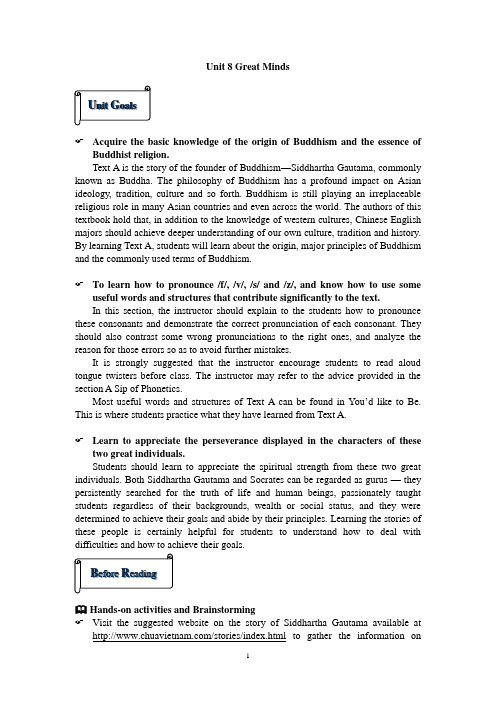
Unit 8 Great Minds☞Acquire the basic knowledge of the origin of Buddhism and the essence of Buddhist religion.Text A is the story of the founder of Buddhism—Siddhartha Gautama, commonly known as Buddha. The philosophy of Buddhism has a profound impact on Asianideology, tradition, culture and so forth.Buddhism is still playing an irreplaceablereligious role in many Asian countries and even across the world. The authors of this textbook hold that, in addition to the knowledge of western cultures, Chinese English majors should achieve deeper understanding of our own culture, tradition and history. By learning Text A, students will learn about the origin, major principles of Buddhism and the commonly used terms of Buddhism.☞To learn how to pronounce /f/, /v/, /s/ and /z/, and know how to use some useful words and structures that contribute significantly to the text.In this section, the instructor should explain to the students how to pronounce these consonants and demonstrate the correct pronunciation of each consonant. They should also contrast some wrong pronunciations to the right ones, and analyze the reason for those errors so as to avoid further mistakes.It is strongly suggested that the instructor encourage students to read aloud tongue twisters before class. The instructor may refer to the advice provided in the section A Sip of Phonetics.Most useful words and structures of Text A can be found in Y ou’d like to Be. This is where students practice what they have learned from Text A.☞Learn to appreciate the perseverance displayed in the characters of these two great individuals.Students should learn to appreciate the spiritual strength from these two great individuals. Both Siddhartha Gautama and Socrates can be regarded as gurus — they persistently searched for the truth of life and human beings, passionately taught students regardless of their backgrounds, wealth or social status, and they were determined to achieve their goals and abide by their principles. Learning the stories of these people is certainly helpful for students to understand how to deal with difficulties and how to achieve their goals.Hands-on activities and Brainstorming☞Visit the suggested website on the story of Siddhartha Gautama available at /stories/index.html to gather the information onBuddha. Non-cyberists may rely on the library for gathering information.☞Develop the gathered information on Siddhartha Gautama into a presentation.The presentation should focus on the life experiences of the Buddha. If conditions allow, a PowerPoint presentation is encouraged.A Glimpse at Words and ExpressionsA.“expect”refers to “look forward to coming occurrence”. “Expect”can also beused as an intransitive verb, which means “to look forward to the birth of one's child”. I t is used in progressive tenses. For example: His sister is expecting in May.B.“raise”here means “bring up(children)”. For example: I was born and raised acity boy.C.“restless”means “anxious, unable to stay still”. For example: After five years inthe job, he was beginning to feel restless.D.“win the hand of sb.” can be understood as “make sb. fall in love with you”. Thefrequently used phrase is “win sb.’s heart”.E.“take pity on”means “show sympathy to”, it also can be expressed as “have pityon”. For example: Please have pity on him! He has no place to stay.F.“occurrence” refers to “something that takes place”. For example: Theft used to bea rare occurrence in this village.G.“enlightenment” is explained as “completely understood the truth of humanity”. Itis commonly used in the situation that someone has had or shown an understating of people’s need, a situation, etc.Keys: A-6; B-4; C-7; D-2; E-3; F-5; G-1Introduction to the textBy learning Text A, students will be familiar with the life story of Siddhartha Gautama, commonly known as Buddha. This article gives the students an opportunity to touch the essence of ancient Asian culture. Despite the language contribution, this article conveys a great spiritual character of mankind, which inspires people to pursue one’s goal perseveringly in the course of life.Dr. C. George BoereeThe author, Dr. C. George Boeree, is a faculty member of the psychology department of Shippensb.urg University. He specializes in personality theories and the philosophical side of psychology, and is especially interested in phenomenological, existential, and Buddhist psychology, and in epistemological and moral development. Among his other interests are languages, history, and the web.Detailed information of Dr. C. George Boeree can be found at his personal webpage /cgboer/.Explanation of words, expressions and structures1.She had had a strange dream in which a baby elephant had blessed her with histrunk, which was understood to be a very auspicious sign.auspicious (adj.): (formal) showing signs that sth. is likely to be successful in the futureeg. 1) Wish you an auspicious start to the new academic year.2) After the selection of auspicious dates, wedding details are decided.2.As was the custom of the day, when the time came near for Queen Mahamaya tohave her child, she traveled to her father’s kingdom for the birth.custom (n.): a practice followed by people of a particular group or regioneg. 1) It is the custom in that country for women to marry young.2) As was the custom of the day, girls were not allowed to go to school.custom (n.): the fact f a person or people buying goods or services at a shop or businesseg. 1) Thank you for your custom. Please call again.2) We have lost a lot of custom since prices went up.3.In a small town, she asked her handmaidens to assist her to a nearby grove of treesfor delivery.delivery (n.): the process of giving birth to a babyeg. 1) When I entered the delivery room, Kathy was in absolute agony, crawling around on her hands and knees and screaming out in pain.2) The family was so poor that they couldn’t afford a proper delivery inhospital.delivery (n.): the way in which sb. speaks, sings a song, etc. in publiceg. 1) The beautiful poetry was ruined by her poor delivery.2) His speeches were magnificently written but his delivery was hopeless.4.He could speak, and told his mother that he had come to free all mankind fromsuffering.to free… from…: to remove something unpleasant from sth.eg. 1) These exercises help free us from tension of our bodies.2) The centre aims to free young people from dependency on drugs.3) We hope we can be freed from piles of documents and numbers of meetingas soon as possible5.Asita proclaimed that he would be either a great king, even an emperor, or hecould become a great sage and savior of humanity.to proclaim (v.): to publicly and officially tell people about sth. importanteg. 1) The ringing bells proclaimed the news of the birth of the prince.2) New regulations on the wages for holiday jobs in the college wereproclaimed.to proclaim (v.): to show sth. clearlyeg. 1) This building, more than any other, proclaims the character of the town.2) His manners proclaimed him a gentleman.6.The king, eager that his son should become a king like himself, was determined tokeep the child from anything that might result in him taking up the religious life.to be determined to do sth.: to make up one’s mind to do sth.eg. 1) I’m determined to succeed.2) Many members are determined to prove that they are responsible.to determine (v.): to discover the facts about sth.; to calculate sth. exactlyeg. 1) An inquiry was set up to determine the cause of the accident.2) We set out to determine exactly what happened that night.to determine (v.): to make sth. happen in a particular way or be of a particular typeeg. 1) Age and experience will be determining factors in our choice of candidate.2) Upbringing plays an important part in determining a person’s character.to result in: to cause sth. happeneg. 1) The hurricane has resulted in thousands of death.2) These policies resulted in many elderly and disabled people sufferinghardship.to take up: to enter into (a profession or business)eg. 1) He will take up his post as the head of the civil courts at the end of next month.2) Since taking up writing romance in 1967 she has brought out over fiftybooks.to take up: to fill or use an amount of space or timeeg. 1) These files have been zipped up to take up less disk space.2) Her time was fully taken up with writing.to take up: to continue, especially starting after sb./sth. else has finishedeg. 1) The band’s new album takes up where their last one left off.2) It’s my turn to take up the story where Betty stopped.7.And so Siddhartha was kept in the palace, and was prevented from experiencingmuch of what ordinary people might consider quite commonplace.to experience (v.): to have and be aware of a particular emotion or physical feelingeg. 1) I experienced a moment of panic as I boarded the plan.2) Most students hadn’t experienced what hardships meant before they enteredthe university.experienced (adj.): having knowledge or skilleg. 1) He is much experienced in teaching.2) An experienced guide is provided during your stay.commonplace (adj.): having no remarkable featureseg. 1) Some scientists believe that soon it will be commonplace for people to travel to the moon.2) Computers are commonplace in many families in China.8.…or anyone who had dedicated themselves to spiritual practices.to dedicate yourself/sth. to sth.: to commit (oneself) to a particular course of thought or actioneg. 1) She dedicates herself to her work.2) He dedicated his life to helping the poor.to dedicate sth. to sb.: to say at the beginning of a book, a piece of music or a performance to show respect or thank sb.eg. 1) This book is dedicated to my parents.2) This movie is dedicated to Jane—a friend in memory.dedicated (adj.): working hard at sth. because it is very important to you;devotedeg. 1) Mrs. Johnson is a dedicated teacher as well as a fine researcher.2) His death is a great loss in music because he was such a dedicated musicianof more than 100 pieces in his life.9.As he was led through the capital, Siddhartha chanced to see a couple of old menwho had accidentally wandered near him.to chance (vi.): to come about sth. without purposeeg. 1) If I do chance to find out where she is, I’ll inform you immediately.2) It chanced that they were staying at the same hotel.accidentally (adv.): unintentionallyeg. 1) As I turned around, I accidentally hit him in the face.2) The damage couldn’t have been caused accidentally.10.Amazed and confused, he chased after them to find out what they were. Then hecame across some people who were severely ill.to come across sb./sth.: to meet or find sb./sth. by chanceeg. 1) I came across children sleeping under bridges.2) She came across some old photographs in a drawer.to come across: to make a particular impressioneg. 1) She comes across well in interviews.2) He comes across as a very sincere individual.to come across (with sth.): [no passive] to provide or supply sth. when you need iteg. 1) I hoped she’d come across with more information.2) To pay over money that is demanded: came across with the check.11.He had discovered suffering, and wanted more than anything to discover how onemight overcome suffering.more than anything: the most; badly; eagerlyeg. 1) Jenny likes dancing more than anything else.2) Memories are usually worth more than anything you can buy.12.For six years, he practiced austerities and self-mortifications, …to practice: to do sth. regularly as part of your normal behavioreg. 1) Parents need make their children practice self-restrain.2) Do you still practice your religion?to practice (as sth.): to work as a doctor, lawyer, etc.eg. 1) There are over 50,000 solicitors practicing in England and Wales.2) He was banned from practicing medicine.13.He redoubled his efforts, refusing food and water, until he was in a state of neardeath.in a state of: (a person or a thing) in a mental, emotional or physical condition eg. 1) I am in a confused state of mind.2) He was in a state of depressing permanently.3) The building is in a bad state of repair.14.Siddhartha remained completely calm. Then he sent his three beautiful daughtersto tempt him, again to no avail.to remain [linking verb]: to continue to be sth.; to be still in the same state or conditioneg. 1) Train fares are likely to remain unchanged.2) It remains true that sport is about competing well, not winning.3) In spite of their quarrel, they remain the best of friends.to remain (v.): to still need to be done, said, or dealt witheg. 1) Much remains to be done.2) It remains to be seen whether you are right.3) There remained one significant problem.to tempt (v.): to attract sb. or make sb. want to do or have sth., even if they know it is wrongeg. 1) I was tempted by the dessert menu.2) Don’t temp thieves by leaving valuables clearly visible.temptation (n.): the desire to do or have sth. that usually is bad or wrongeg. 1) His business failure is due to the temptation of easy profits.2) I couldn’t resist the temptation to open the letter.3) An expensive car is a temptation to thieves for sure.15.Finally, he tried to ensnare Siddhartha in his own ego with his own pride. That,too, failed.to ensnare (v.): to make sb./sth. unable to escape from a difficult situationeg. 1) This center is set up for young homeless people who become ensnared in drugs.2) The brothers fled to Germany, only to be ensnared in war.16.… he gave his first sermon, which is called “setting the wheel of the teaching inmotion.”“setting the wheel of the teaching in motion” is not the tile of his first sermon.This is used to describe his action of giving the first sermon. “to set the wheel in motion”means “to start doing sth.”. In Chinese “setting the wheel of teaching in motion” is “初转法轮”.17.The king of Magadha, having heard Buddha’s words, granted him a monasterynear his capital, for use during the rainy season.to grant (v.): to bestow; to give formally or legallyeg. 1) The authorities wouldn’t grant us permission to fly to San Francisco.2) China has been granted membership of the World Trade Organization.to grant (v.): to admit that sth. is true, although you may not lie or agree with it eg. 1) I grant the genius of your plan, but you still will not find supporters.2) I grant you that it looks good, but it is not very practical.to grant (n.): a sum of money that is given by the government or by another organization to be used for a particular purposeeg. 1) Student grants will be frozen at existing levels.2) She has won a grant, which means she can go to Asia to research her book.to take it for granted: to believe sth. is true without first making sure that it is eg. 1) He seemed to take it for granted that he should speak as a representative.2) I just took it for granted that he’d always be aroundto take sb./sth. for granted: to be so used to sb./sth. that you do not recognize their true value any more and do not show that you are grateful eg. 1) Have I been neglectful of my friend, taking him for granted?2) We take having an endless supply of clean water for granted.3) We have to re-educate the public very quickly about something they havealways taken for granted.4) I came into adult life clueless about a lot of things that most people take forgranted.18.This and other generous donations permitted the community of converts tocontinue their practice throughout the years.convert (n.): a person who has changed their religion, beliefs or opinionseg. I thought he was a Buddhist, but it turned out he was a convert to Islam.to convert (v.): to change or make sb. change their religion of beliefseg. 1) He converted from Christianity to Islam.2) She was soon converted to the socialist cause.to convert (v.): to change or make sth. change from one form, purpose, system, etc. to anothereg. 1) The hotel is going to be converted into a nursing home.2) What rate will I get if I convert my dollars into euros.3) We’ve converted from coal to gas central heatingto convert (v.): to change an opinion or habiteg. 1) I didn’t use to like opera but my sister has converted me.2) I’ve converted to organic food.19.Over time, he was approached by members of his family, including his wife, son,aunt, and his father, Shuddodana.to approach (v.): to come near to sb./sth. in distanceeg. 1) I heard the sound of an approaching car.2) As you approach the town, you will see the university on the left.to approach (v.): to come close to sth. in amount, level or qualityeg. 1) The company’s profit this year is approaching 30 million dollars.2) Few writers approach his richness of language.to approach (n.): a way of dealing with sb./sth.; a way of doing or thinking about sth. such as a problem or a taskeg. 1) The school has decided to adopt a different approach t discipline.2) I think you have taken the wrong approach in your dealings with them.to approach (n.): a path, road, etc. that leads to a placeeg. 1) All the approaches to the palace were guarded by troops.2) We found a taxi on our way out the approach to the museum.to approach (n.): movement nearer to sb./sth. in distance or timeeg. 1) She hadn’t heard his approach and jumped as the door opened.2) The approach of winter brings cold weather.20.His aunt and wife asked to be permitted into the Sangha, which was originallycomposed only of men.to be composed of: to be made up ofeg. 1) The committee was mainly composed of lawyers.2) The nation is composed of many ethnic groups.to compose (v.): to combine together to form a wholeeg. 1) Twenty lawyers composed the committee.2) Many ethnic groups compose our nation.to compose (v.): to write music, a letter, speech, poem, etc.eg. 1) Mozart composed his last opera shortly before he died.2) She composed a letter of protest.21.The culture of the time ranked women far below men in importance.to rank (v.): to give a particular position on a scale according to quality, importance, success, etc.eg. 1) This town ranks high among beauty spots.2) This university is ranked number one in the country for engineering.to rank (adj.): having a strong unpleasant smelleg. 1) The house was full of the rank smell of spoiled food.2) When I came back home, to my surprise, I found my house was of the ranksmell of unwashed clothes.22.Strive on with awareness.to strive (vi): to endeavoreg. 1) We encourage all members to strive for the highest standards.2) We call on a campaign striving against corruption.释迦牟尼是佛教创始人。
牛津深圳版英语九年级上册:Unit 2 《Great minds》 (Period 3) PPT课件(共18页)
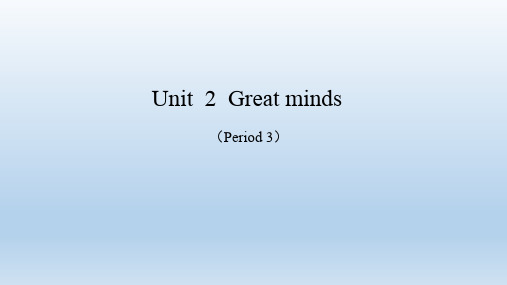
Discuss with your partner and improve the conversation below.
Suggested conversation:
Homework
1. 根据听力笔记,口头复述三位伟人的生平。 2. 把在Speak up部分讲述的名人趣味故事写下
来,并交由英语课代表收集起来,在教室 后面布置一个“名人趣味故事角”。 3. 模仿录音的语音、语调,朗读Talk time部分 的对话。 4. 完成Listening and speaking的练习。
Albert Einstein William Shakespeare
Confucius
Do you know these people? How much do you know about the three people?
Look at the notes.
Listening
Listen to a radio programme about three great minds and complete the information cards below. Write one word or figure in each blank.
Talk time
Leaving and taking phone messages Sometimes people cannot answer calls. When this happens, we can leave and take messages like this:
Read the conversation below and practise it in pairs. Pay attention to the words in blue.
广东省深圳市九年级英语全册 Chapter 8 Great minds Writing教学课件 牛津

First, arrange the facts and events in a clear time order such as the time, the place, and the main persons. Second, pay attention to the verb tenses! As the story is about the past, so it’s in the past tense.
writing
• 请以“A Trip”为题,写一篇短文。要求包括 以下要素:Where did you go last weekend? Who did you go with? What happened? How was the trip?
writing
• I went hiking to a mountain with my friends last weekend.
1) sense of playinቤተ መጻሕፍቲ ባይዱ 2) wonderful on the said play a on your agreed 3) was, over, on his, noticed, in the gave 4) arrived at, gave, his talk, told, his, are, jump, will be, 5)waited, after, to ring, said, knew had played callers said obeyed instructions floated in the
• It was a good trip in the beginning, but something unexpected happened on the half way. One of my friends Tim suddenly felt a terrible pain in his stomach and he couldn’t move any further. Nobody knew what to do.
Chapter 8 Great Minds (知识要点检测)课件(牛津深圳版九年级全册)

Байду номын сангаас
一、词性变化:( 35’ )
• 1. genius n. 天才[C] geniuses(复数) • 2. gift n. 礼物=present [C] =talent [UC] 天 才 adj. 有天分的 gifted=talented • 3. attempt n 试图,尝试 v. 试图,尝试 attempt to do/ doing make an attempt to do尝试去做 • 4. work v. 工作,运转,起效 n. 工作 [uc] works n. [C] [pl] 作品,工厂
二、重点词组:
• • • • • • • • • • 1. 把…当做;把…看作 regard…as 2. 使…著名make…famous 3. 有…的天赋 have a gift/talent for 4. 幽默感 a sense of humour 5. 收到很多邀请receive many invitations 6. 做…是件乐事It’s a pleasure to do sth 7. 去…的路上 on the way to 8. 使sb失望 let sb down 9. 如此…以至于so…that 10. 熟记 learn sth by heart
• 5. curiosity n. 好奇心 curious adj. 好奇 的 curiously (adv.) 好奇地 • 6. humour (un.) 幽默 humorous (adj.) 幽 默的 • 7. perfectly (adv.) 完美地 (=without any mistake) perfect (adj.) 完美的 • 8. wood (n.) 木头 woods (c.) 森林= forest wooden (adj.) 木头的;木制的 • 9. distant (adj.) 遥远的,远处的 distance (un.) 距离 distantly adv. 疏离地,冷淡地 • 10. call (v./n.) 打电话; 给…命名; called (adj. not before noun) 叫做;称作
- 1、下载文档前请自行甄别文档内容的完整性,平台不提供额外的编辑、内容补充、找答案等附加服务。
- 2、"仅部分预览"的文档,不可在线预览部分如存在完整性等问题,可反馈申请退款(可完整预览的文档不适用该条件!)。
- 3、如文档侵犯您的权益,请联系客服反馈,我们会尽快为您处理(人工客服工作时间:9:00-18:30)。
★ gift n.
= talent
= present
Simon failed to set a new record, but it was a good attempt. (n.) We attempted to climb to the top of the mountain, but we were stopped. (v. 企图) She attempted walking along the rail.(试 着走铁轨) make an attempt to do something
a story full of humor 非常幽默的故 a sense of humor 幽默感
Hale Waihona Puke e.g. Bill has a good sense of humor. Anna lacks a sense of humor. humorous adj.幽默的
1. I have plenty of __________ humorous tales/ stories. 2. He has __ B a sense of ___. A. much; humors B. much; humor C. many; humors D. many; humor
遥远的,远处的
distance n. 距离
What is the distance between Guangzhou and Shenzhen? = How far is it from Guangzhou to Shenzhen ?
distant relations (远亲) the distant sound of a bell (远处的钟生) in the distance (在远处) treat somebody distantly (冷淡地对待) look at something at a distance (从远处看) a long-distant call (长途电话)
e.g. She has a gift for dancing. She has a gift for music. John has many outstanding gifts.
Beethoven
Mozart
★genius n.
A person who is very intelligent. Here are two geniuses.
The furniture is made of wood. Walking in the woods is great fun! a wooden bridge // bed // spoon He used to live in the woods.
leather
“Stop” the policeman called out. (shout) The frightened boy called for help. (ask for) Let’s call on John this weekend. (visit sb. ) Why not call at John’s now? (pay a visit to someplace)
1. His _______ attempt to work as an actress makes everyone excited. 2. He _________ attempted to help the girl in trouble, but he was too late.
a lot of hard work // at work // homework // housework // go to work work out = solve work at = try hard work on = be busy with work as = act as
九年级 Chapter 8
Vocabulary Listening
Reading
Language
Writing
Speaking
= present a birthday/ Christmas/ wedding gift a gift for sth/doing sth
a talent or natural ability
What is your work? = What is your job? = What do you do? = What are you? Does this machine work? = Does this machine run?
Can you make the machine work? = Can you operate// run the machine? Your idea didn’t work. = Your idea wasn’t successful.
We all know her called (named) Debbie. I will call you up this evening. = I’ll ring you up this evening. I have a few calls to make. (我要打几个电话) There is morning call in the hotel.
n. 研究;调查
medical/scientific/historical research
carry out/do research进行、作研究
research into/on sth
a piece of research into the cause of cancer
完美地;极佳地 perfect adj. 美好的 perfect weather/ behavior 美好的天气;优秀的品行 e.g. Nobody is perfect. Practice makes perfect. e.g. The trousers fit perfectly.
woods = forest // wooden
